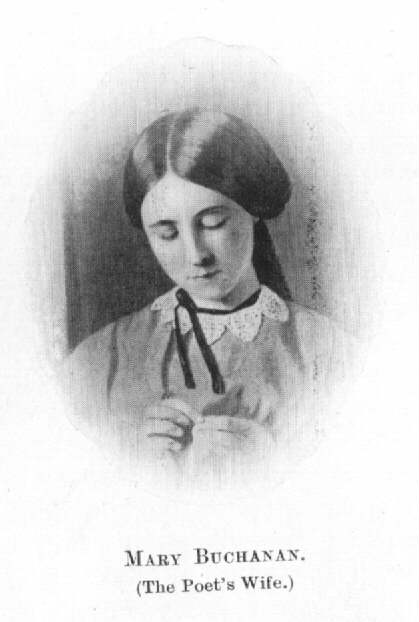ROBERT WILLIAMS BUCHANAN (1841 - 1901)
|
ROBERT WILLIAMS BUCHANAN (1841 - 1901) |
|
|
|
|
|
|
|
|
|
|
 |
|
(MARY BUCHANAN. - The Poet’s Wife.) 100 MARRIAGE, 1861
IT was towards the close of the year 1861 that he married my sister, who was not yet out of her teens, and who was afterwards known among his friends as “Buchanan’s lovely wife.” “She was (wrote Mr. O’Connor in M. A. P.) “a very beautiful woman, stately and statuesque in figure, with beautifully chiselled, regular features, fine eyes, and a gay and almost bubbling spirit. But early in her married life she was attacked by one of those painful internal maladies which are the death of health and domestic happiness, and often she suffered tortures. Indeed, I remember seeing her once laughing and chattering like some bright singing bird, and in the midst of it a shade suddenly fell upon her face, and turning to me she said: ‘If you speak to me, I shall have to burst into tears.’ I was young in years and even younger in experience, and knew nothing at that time of that strange world of laughter and tears, of heroic suffering and tragic depression, which is the world of the invalid woman, but the moment remained with me afterwards, an illuminating glimpse into the unfathomable depths of secret and silent sorrow and pain in which we move unconsciously among our fellow men and women.” 1 Pearson’s Weekly. 105 G. H. LEWES AND ROBERT BROWNING, 1862
A VERY powerful influence was that of the late G. H. Lewes, whose name, coupled with that of the lady so well and widely known as “George Eliot,” appears very frequently both in the published work and private letters of Mr. Buchanan. “‘We mortals are as men on ships at sea, But this particular occurrence, he suggested, was so extraordinary, so unanticipated—he had been familiar with Death before, but it had always approached with some kind of warning, and he proceeded to describe in detail, as he afterwards described in his poem, the piteous circumstances of the event which had so amazed him. His manner was that of a child startled amid its play, by a lightning-flash which strikes down one of its 113 companions. He was completely agitated and unstrung. Early in our acquaintance we had several verbal battles, in which, I need hardly say, I was easily vanquished. On one occasion, when I was lunching at his house, I was unsuspecting enough to avow my deep admiration for the American Poet, Walt Whitman. No sooner had I done so than I found that I had loosened an avalanche. 1 “Latter Day Leaves.”
To Chapter XI: First Books, 1863-66 or back to Contents
|
|
|
|
|
|
|